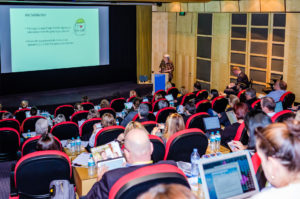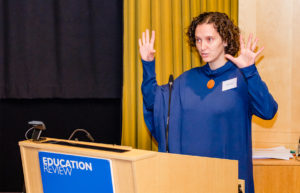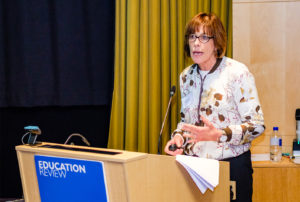"Like #MeToo, we need a hashtag," Lynne Symons declared. The former principal of the largest school in South Australia – now an educational leadership consultant – was referring to the need for greater awareness of the mental health crisis among Australian principals, school staff and students.
Speaking yesterday at the Education Review Managing Student and Staff Wellbeing in Schools seminar, Symons lamented the fact that although schools are the "last bastion of middle class Australian life, they are blamed for everything".
"As a principal, I was asked things by parents like 'why was my child on Facebook at 2.00am?'," she said.
Her concerns are supported by evidence: the latest Australian Principals Health and Wellbeing Survey Report found 'significant increases in the stress caused by Mental Health issues of both students and staff over the 6-year survey period'.
She attributes much of leader and staff stress to them having to constantly wear their 'game faces'. Added to this, the Principals Health Survey reported that principals are interrupted, on average, 70 times per day, leading to much longer working hours.
Despite this, she says principal and school staff wellbeing is overlooked. In the Principals Survey, respondents reported their level of support as less than one out of 10.
"It's a systemic, not an individual problem," she said, and because of it, numbers of applicants for principalships are dropping. Though, she has an individual, personal take on it: a while into her principalship at Mark Oliphant College, she felt like giving up. "It wasn’t a health issue. I just didn’t want to do it anymore," she said.
"I was at point where I needed to get counselling. I was diagnosed with a form of PTSD – compassion fatigue syndrome. I couldn't care anymore; I was actually exhausted. I constantly felt that I couldn't quite get it right."
So now, she's helping others – principals and staff – feel as though they're good enough. She suggests praise, which is shown to cause a five per cent increase in performance, as a starting point. Then, there's working on physical wellbeing. "If you do nothing else from today for yourself, make sure you have your yearly physical, especially if you're over 45," she suggested.
Other tips she recommended for mental wellbeing include setting work/life boundaries (for instance, no answering emails on weekends), prescribed 'worry journaling' or making to-do lists, and fostering tiny, positive habits, like walking the dog around the block each day.
"We get caught up trying to do all the workplace principles of wellbeing – but we can't do everything," she mused.
Think of the children, and the teachers
Principal wellbeing was but a segment of the seminar. The bulk of it was on staff and student wellbeing. To this end, Dr Rebecca Collie, Scientia Fellow and Senior Lecturer in Educational Psychology at UNSW, attempted a definition of the term.
Wellbeing, she offered, is achieved through a combination of hedonism (pleasure) and eudaimonism (meaning) and leads to healthier academic, social and emotional outcomes. Applying this to schools, and drawing on 30 years of empirical research (including her own), she found three areas that drive wellbeing: belonging, autonomy and competence, and adaptability.
First, belonging (a sense of connectedness to others) is essential for both student and staff wellbeing, "because teaching and learning is relational," she explained. Belonging is linked to enhanced student enjoyment, participation, motivation, achievement, as well as better personal outcomes.
Teachers, too, benefit from feeling connected to their students and colleagues. Studies show that connected teachers are more motivated, committed to their jobs, and have a greater sense of personal wellbeing.
Autonomy (the perception that we are responsible for our own choices) and behaviour and competence (feeling effective) are associated with students' academic motivation, less anger, and better mental health, Collie advised. For staff, they're associated with better job commitment, motivation and satisfaction, in addition to personal wellbeing.
The reverse of many of these things is also true: without belonging, autonomy and competence, there is more disengagement, self-sabotage, negative homework practices, and, resultantly, lower achievement.
Adaptability is the third major school wellbeing focal point. This is because there's a "constant need to regulate emotions at school," Collie informed. If you're adaptable, therefore, you'll be able to do this more easily. For example, if a student is faced with an unfamiliar maths problem and is adaptable, instead of becoming angry or frustrated, they might attempt to solve it by drawing on their prior knowledge or asking for help. Not only is this likely to lead to a solution to the specific problem, adaptability is actually related to greater maths achievement in general. Teachers' expectations of students adaptability, too, enhance maths results. More broadly, adaptability is correlated with greater life satisfaction, engagement and achievement.
The hardest part is promoting belonging, autonomy and competence, and adaptability, Collie admitted. Yet she had some suggestions. For student autonomy, she said staff should encourage them to ask questions and help them understand issues from others’ points of view. For competence, they can “give students ‘missions’ or help them set ‘personal best’ goals”.
She didn't neglect teachers: for belonging, they can organise group activities like bringing communal lunches to the staff room. And importantly, for autonomy, teachers need to be told it's ok to 'switch off' from work. "We must counter the idea that it’s selfish to look after after our own wellbeing,” Collie pronounced.
Take preventative care of yourself
There are tactics teachers can use to, depending on the severity of the emotional strain, prevent it in the first instance. Noelene Weatherby-Fell outlined how resilience training can help.
The Senior Lecturer and Master of Teaching Programs Coordinator in the School of Education at the University of Wollongong is also a project team member on the OLT project, BRiTE (Building Resilience in Teacher Education).
Though BriTE, a free, online resource, was initially developed for pre-service teachers, it is being extended to teachers at all experience levels.
Resilience leads to better teacher quality, retention, wellbeing, as well as better student outcomes, Weatherby-Fell stated.
Rose Pennington echoed Weatherby-Fell's views on resilience, with a student-centric twist. The primary school teacher at Bondi Public School and PhD candidate and lecturer at the Australian Catholic University uses Noble and McGrath's PROSPER (Positivity, Relationships, Outcomes, Strengths, Purpose, Engagement, and Resilience) framework to increase students' social and emotional learning. Beginning with positivity, Pennington indicated that this emotion is "everything other than negativity". Curiosity, for example, is a positive emotion. "You can ask students, 'what are you interested in, and why?' Once they tell you, you can encourage them to do more of it."
Positivity is important for more than surface-level reasons, she contended. It yields a mix of academic and emotional benefits as it promotes creativity and receptiveness.
Methods of positivity-boosting Pennington uses in her classrooms include, for Year Two, an 'appreciation station', where every so often, students write down something or someone that they're grateful for. "Expressing gratitude is powerful for happiness," she said. "It's especially powerful for people who are feeling low."
To the 'R' for relationships in the PROSPER framework, Pennington suggested schools focus on their communities, and use methods or activities like hanging student artworks in the halls or fundraiser BBQs to tighten these. "Research shows students just need the perception that they're cared for," she said.
Creating solid relationships is also about role modelling. She believes teachers should display honesty and encourage kindness – the latter, for instance, by reference to feelings buckets – in classrooms.
For outcomes, when it comes to feedback, Pennington subscribes to Stanford researcher Carol Dweck's 'growth mindset' theory to push students to achieve their best. This has the added advantage of reinforcing tenacity and resilience.
But, to properly instil these messages, teachers need to slow down. "People need an average of seven seconds to consider a question. Teachers tend to give about one and a half seconds," Pennington said.
First, go the f* to sleep!
An optimum state of wellbeing – for students or staff – cannot be met without adequate sleep. This was Dr Jennifer Smith's take home message. The lecturer, child and adolescent psychologist and English and special education teacher has heard sleep being described as "a waste of time" by her child and teenage clients and students. Her book But I'm Not Tired!, a play on the New York Times comedic bestseller Go the F* To Sleep, seeks to correct this serious misconception.
Not only is sleep critical for survival; it is fundamental to wellbeing as well as academic success. Sleep hygiene is associated with mood regulation, positive social experiences, behaviour regulation, memory and cognition abilities, illness and pain management, weight management, and school/work attendance.
The problem is, young people aren't getting enough of it. A 2012 study involving 700,000 participants aged 5 to 18, from 20 countries, proved this. Of this group, presently a quarter of young people are chronically sleep-deprived.
Sleep – or a lack thereof – particularly impacts teenage school children as their circadian rhythms are different to those of adults, yet school timetables are aligned with adults' sleep needs, Smith explained. They are naturally alert later in the day, meaning they're groggier earlier in the day. Unfortunately, important school subjects are often scheduled early in the morning, when they’re awake in name only.
Further, "sleep deficits lead to biological stress – the antithesis of wellbeing," Smith apprised. When school students suffer poor sleep, most commonly caused by 'behavioural insomnia', their attention, planning, impulse control, and emotional regulation skills are affected. A lack of sleep is also associated with learning difficulties, anxiety and weight gain.
Behavioural insomnia is what it sounds like: insufficient sleep caused by behavioural, as opposed to physical factors. These include too-late sleep times and sleep that is disrupted, often due to the use of technological devices.
So, what have schools got to do with it? A lot, Smith proposes, as they are often on the front lines of noticing and reporting students' ill health to relevant parties – be they GPs or psychologists. In the meantime, Smith advises that teachers should check their own sleep hygiene: the impact of poor sleep is just as adverse for teachers, and two sleep deprived generations in one classroom is not a good mix.
Tech for good?
Western Sydney University researcher and founder and CEO of TechClever, Joanne Orlando's presentation focused on the third, equally important school stakeholder group: parents. In particular, wellbeing-wise, she's concerned that they are only hearing negative messages from schools about their children's use of technology. "Screen time is the latest dirty word," she said. "There's real uncertainty [among parents]. They don’t know what to do and they're not convinced children should be using technology at all."
For the wellbeing of families, then, teachers can, in addition to cautioning parents about technology's downsides, inform them of its upsides. Orlando referred to activism that's coordinated via social media, for example, the anti-gun campaigns following school shootings in the US.
She also alluded to her latest research on young people's use of the most popular social media platform: Instagram. Many now have two accounts; a 'real' one displaying their edited lives, and a 'fake' one, under a pseudonym, showing their real lives. "We are seeing a lot of leadership and creative thinking [in this space]," Orlando reflected.
Technology and teachers was touched upon, too. Orlando noted that young teachers especially may have it hard, as it is often assumed they are tech whizzes. "It causes stress because they're trying to work out pedagogy and technology at the same time," she said.
All together now
The last seminar session involved a panel consisting of Symons, Weatherby-Fell and Smith, chaired by Orlando. The audience asked them questions, to which they responded.
To what extent should parents play a role in student wellbeing, as there has been a historical shift in responsibility for this from parents to teachers? Forty years ago, there wouldn’t even be a seminar on this topic.
Smith: I think there is a middle ground. There is a concern that parenting has become more permissive. Parents fear putting in boundaries. To some extent, this is out of their hands as they don’t always know what their children are up to. It is in our interests to encourage parents to take a stronger parenting role; not that we expect them to become authoritarian. The one thing I spend a lot of time doing is entitling parents to do this. Try to offer them strategies to do this without alienating children. There's a difference between authoritative and authoritarian parenting.
Democracies don’t work for young children. For tweens and teens, try negotiation around issues. Bargain with them in the way you would at a stall in Thailand.
Symons: Mark Oliphant College - where I was principal – had 1,600 students from childcare to post-Year 12. It became a one-stop shop. There were babies having babies. Trying to set boundaries for kids who've never had them is really difficult. Will it go back to parents setting boundaries? No, though that will somewhat depend on your affluence and or belief system. One issue is that society perpetuates that the status quo is how it should be. It ain’t going to stop so we have to get with it.
Weatherby-Fell: We aren’t seeing a lot of resilient parents: we are seeing results of helicopter and snow plough parents in society. Though learnings from the classroom often go back to the home, so lets hope that happens.
Is social media overall a good or a bad phenomenon for young people?
Smith: Overall, it's negative. Young people benchmark themselves against their peers, and when they do this on social media, they're benchmarking themselves against lies. It can lead to anxiety and depression. The research is pretty grim. Also, social media's effects on sleep are vast, because it’s a 24-hour cycle. Kids are on it through the night and the day. Girls are more involved in socialising on it, whereas boys are more likely to use it for gaming.
Symons: There are a whole lot of inhibitions that kids lose on social media. The prevalence of sexting and cyberbullying is huge. I'm a huge advocate for tech, but it entails massive issues.
What's an example of a good support system for teachers?
Smith: I think it's problematic that mentoring and supervision are mandated for psychologists, but not for teachers.
Symons: My school had an onsite psychologist. We were brilliant in a crisis, you probably all are. But it's after that when things start to fall apart. I think a teacher wellbeing program has to be systematic and run by professionals.
What are the differences you see between new and more established teachers?
Orlando: University lecturers are more overloaded now. This means they have less time to devote to student teachers. In turn, students are less connected than they used to be.
Smith: I've heard teaching undergrads say they wished they were back at school, where they had more support.
Do you have an idea for a story?Email [email protected]
 Education Review The latest in education news
Education Review The latest in education news




Is there any support online for the new teachers that struggle? The pier teachers are under their own level of stress and overwork. Just a chat to someone in the field that would understand the specific pressures from children, parents, peers, school policy, government benchmark and reporting.They do seem so swamped and young to cope with the many levels of accountability.